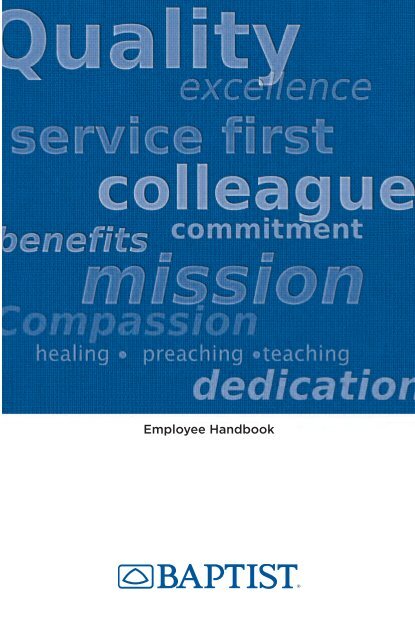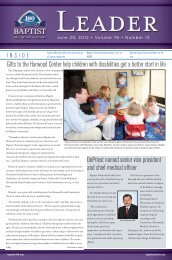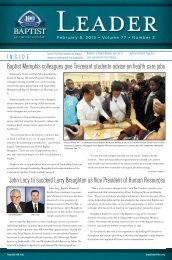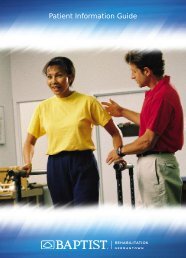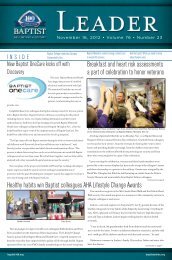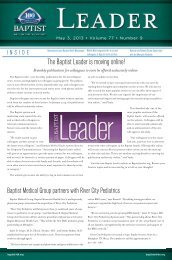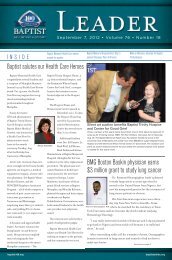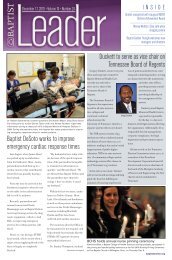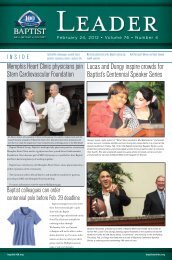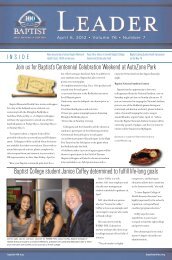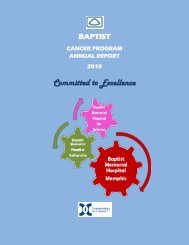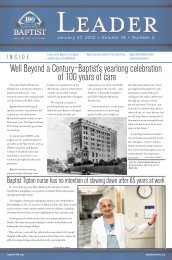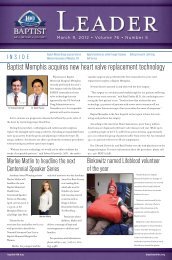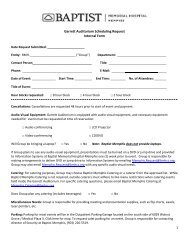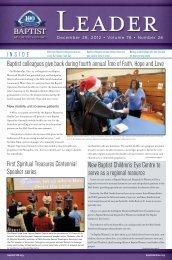Employee Handbook - Baptist Memorial Online
Employee Handbook - Baptist Memorial Online
Employee Handbook - Baptist Memorial Online
- No tags were found...
Create successful ePaper yourself
Turn your PDF publications into a flip-book with our unique Google optimized e-Paper software.
<strong>Employee</strong> <strong>Handbook</strong>
Table of ContentsPresident’s Welcome ......................................................................................5I. IntroductionThe Tradition Lives On ............................................................................7A Commitment to Excellence - Service First..................................8<strong>Employee</strong> <strong>Handbook</strong>................................................................................8Compliance With All Applicable Laws ..............................................9The Employment Relationship ............................................................9II.General Provisions of EmploymentEqual Opportunity Employer ..............................................................10Harassment ................................................................................................10Employment/Placement Process ......................................................13Personnel File ............................................................................................14<strong>Employee</strong> Health Services ....................................................................15Licensure/Registration/Certification................................................15New <strong>Employee</strong> Orientation ..................................................................16Departmental Orientation ....................................................................16Initial Ninety (90) Day Introductory Period ..................................17Classification of Employment..............................................................17Employment Status ................................................................................18Assignment and Utilization of Personnel ......................................19Reduction in Workforce ......................................................................20Termination or Resignation of Employment ................................20Service Bridging ......................................................................................21III. Center for Education and Organizational Development ........22IV. Hours of Work and PayWork Schedule ........................................................................................22Rest and Meal Periods ..........................................................................22Timekeeping..............................................................................................23Overtime ....................................................................................................24Shift Differential ......................................................................................24On-Call/Re-Call........................................................................................24Pay.................................................................................................................25Direct Deposit ..........................................................................................25Deductions From Pay ............................................................................25Performance Evaluation ......................................................................26Wage and Salary ....................................................................................261
V. BenefitsPersonal Time Off (PTO) ......................................................................27Bereavement (Funeral) Benefit ........................................................28Civic Responsibilities: Jury Duty and Voting................................28Professional Time Off ............................................................................29Retirement Plan ......................................................................................29Service Awards ........................................................................................30Educational Assistance ........................................................................30Credit Union..............................................................................................30Social Security ........................................................................................30Health, Dental and Vision Benefits ....................................................31Flexible Spending Accounts ................................................................31Cancer Insurance ....................................................................................32Accident Indemnity Advantage Plan ..............................................32Basic Life/AD&D Insurance..................................................................32Voluntary Life Insurance ......................................................................33Short-Term Disability (STD)/Sick Pay Benefits............................33Long-Term Disability (LTD) Insurance ............................................33Voluntary Long-Term Disability (VLTD) ........................................34Workers’ Compensation and Transitional Duty ..........................34VI. Leaves of AbsenceGeneral Provisions Pertaining to Leaves of Absence................35Family Medical Leave ............................................................................37Tennessee Maternity Leave ................................................................38Sick Leave (Non-FMLA Qualifying) ................................................39Personal Leave ........................................................................................39Educational Leave ..................................................................................40Military Leave ..........................................................................................40VII. CommunicationTelephones/Cellular Phones/Pagers ................................................41Bulletin Boards..........................................................................................41Recording Devices and Cameras ......................................................41Electronic Communications................................................................42Computer Passwords ............................................................................43References and <strong>Employee</strong> Information..........................................44Confidential Information Policy ........................................................44Media ........................................................................................................452
VIII.Expectations and AccountabilityStaff Responsibility for Patients ......................................................45Appearance Standards ........................................................................46Inclement Weather ................................................................................47Employment of Relatives/Fraternization ......................................47Tobacco Free Workplace ....................................................................47Attendance Standards ..........................................................................48Standards of Conduct (SOC) ............................................................50Conflict of Interest ..................................................................................52Tips/Gifts/Gratuities ..............................................................................52Parking ........................................................................................................52Security ......................................................................................................53Safety ........................................................................................................53Code of Conduct for a Safe and Productive Workplace ........53Workplace Violence ..............................................................................55Solicitation, Distribution and <strong>Employee</strong> Access..........................55<strong>Employee</strong> Conduct/Disciplinary Standards..................................56Drug and Alcohol Free Workplace ..................................................57Problem Solving Procedure ..............................................................57Acknowledgement of Receipt of <strong>Handbook</strong> ......................................59Revised TN - 02/20103
Dear <strong>Employee</strong>:Welcome to the <strong>Baptist</strong> <strong>Memorial</strong> Health Care family. As one ofthe largest and most prestigious health care systems in the country,<strong>Baptist</strong> is nationally recognized for its quality care and commitmentto service excellence. We realize our employees are thecornerstone of this success.Each member of our <strong>Baptist</strong> team plays an essential role in ensuringthat we exceed the expectations of our patients, physicians,customers, and guests through dedication, compassionatecare, and responsive service.We hope each employee’s relationship with <strong>Baptist</strong> will be rewardingas we work together to fulfill our mission of healing,teaching, and preaching.Sincerely,Stephen C. ReynoldsPresident and CEO<strong>Baptist</strong> <strong>Memorial</strong> Health Care5
I. IntroductionThe Tradition Lives OnFor nearly a century, <strong>Baptist</strong> <strong>Memorial</strong> Health Care’s physiciansand employees have been outstanding leaders in medicine, notonly in the Mid-South, but nationally and internationally, as well.Today, as the largest private health care provider in the Mid-South,<strong>Baptist</strong> consists of an integrated network of hospitals and multiplespecialized facilities spanning the entire Mid-South region. <strong>Baptist</strong>is proud to be the leading provider of quality health care service ina comprehensive, integrated medical system.Rich in heritage, <strong>Baptist</strong> <strong>Memorial</strong> Hospital was chartered in 1912as a result of the desire and vision of a group of dedicated Southern<strong>Baptist</strong> leaders from the conventions in Tennessee, Mississippi,and Arkansas. Their goal was to provide quality health care to thesick and injured in Memphis, North Mississippi, and Arkansas.Based on the three-fold ministry of Christ, the mission has alwaysbeen to heal, teach, and preach by providing spiritual counseling,medical education, and high-quality health care services.A quartet of strong leaders has led us forward as a health caresystem, always keeping pace with the rapid changes in healthcare. From the inspirational leadership of Mississippi planter andhospital trustee A. E. “Epsie” Jennings to the strong and highlycelebrated direction of Dr. Frank S. Groner, <strong>Baptist</strong> grew from asingle hospital with 150 operational beds into a health systemwith several facilities and more than 2,000 beds. From 1980 until1994, Joseph Powell established the <strong>Baptist</strong> <strong>Memorial</strong> HealthCare system and transformed the organization into one of thecountry’s largest integrated health care networks, with a strongnetwork of regional hospitals serving communities throughoutthe Mid-South.Today, we thrive under the leadership of Stephen Reynolds. Mr.Reynolds provides innovative leadership in an evolving healthcare industry, while continually promoting the Christian philosophyupon which we were founded. At a time when many healthcare organizations are struggling to remain viable, <strong>Baptist</strong> continuesto be a nationally recognized leader in the delivery ofquality patient care and clinical/technological advancements.7
A Commitment to Excellence - Service First<strong>Baptist</strong> has a genuine commitment to customer service that is integratedinto all aspects of our employees’ work life. Service Firstexemplifies our philosophy, rich in tradition, emphasizing the importanceof interpersonal and technical excellence. By exceedingthe needs of all our customers, employees, patients, andphysicians, <strong>Baptist</strong> distinguishes itself from all other health careorganizations.<strong>Employee</strong>s are reminded that Service First is not a program but away of life at <strong>Baptist</strong>.<strong>Employee</strong> <strong>Handbook</strong>This <strong>Employee</strong> <strong>Handbook</strong> is designed as a reference guide toeasily access some of the policies, procedures, benefits, andother information relevant to employment at <strong>Baptist</strong>. The policiesand procedures highlighted in this <strong>Employee</strong> <strong>Handbook</strong> arenot exclusive, but are meant to serve as a guideline because it isimpossible to cover or anticipate all situations that might arise.This <strong>Employee</strong> <strong>Handbook</strong> supersedes all other employee handbooks.This <strong>Employee</strong> <strong>Handbook</strong> is only one of the many channels ofcommunication <strong>Baptist</strong> strives to maintain to create a meaningfuland productive work environment. <strong>Baptist</strong>’s intranet site containsa more detailed explanation of many <strong>Baptist</strong> policies and proceduresset forth in this <strong>Employee</strong> <strong>Handbook</strong>. The intranet site alsocontains additional policies and procedures. It is the responsibilityof all employees to read the contents of this <strong>Employee</strong> <strong>Handbook</strong>carefully and check the intranet site for the most currentversion of <strong>Baptist</strong>’s policies and procedures. If at any time employeesdo not have access to <strong>Baptist</strong>’s intranet site, they shouldcontact their supervisors/managers or the human resources departmentfor guidance.This <strong>Employee</strong> <strong>Handbook</strong> and the policies and procedures on<strong>Baptist</strong>’s intranet site are not intended to and do not create acontract of employment, nor do they create a contractual obligation,promise, or other legal right regarding employment or anyother benefit of employment or terms for separation from employment.All of <strong>Baptist</strong>’s policies and procedures and benefits,whether published in this handbook, on the intranet or unpub-8
lished, may be changed, modified, suspended, cancelled, oramended at any time, in <strong>Baptist</strong>’s sole discretion with or withoutnotice.While the <strong>Employee</strong> <strong>Handbook</strong> and the policies and procedureson <strong>Baptist</strong>’s intranet are intended to serve as reference tools, allemployees are strongly encouraged to communicate openly withtheir managers or supervisors and/or human resources if questionsor issues arise during the course of their employment. However,no statement or promise by a manager or supervisor maybe interpreted as a change in policy nor will it constitute anagreement with an employee.Compliance With All Applicable LawsThe Organization will act in compliance with any and all applicablefederal and state laws, including any amendments to existinglaws and any new laws that may become effective subsequent tothe publishing of this <strong>Employee</strong> <strong>Handbook</strong>. The Organization iscommitted to making a good faith effort to comply with eachand every applicable law. As part of the Organization’s commitment,to the extent any part of this <strong>Employee</strong> <strong>Handbook</strong> is inconflict with an applicable federal or state law, said law shall control.Should any provision of this <strong>Employee</strong> <strong>Handbook</strong> be foundto be invalid, such finding does not invalidate the entire <strong>Employee</strong><strong>Handbook</strong>, but only the subject provision.The Employment Relationship<strong>Baptist</strong> strongly believes it is a great organization and offers apositive and rewarding atmosphere in which to work. <strong>Baptist</strong> alsorecognizes that occasionally, an employee may not be a fit for theOrganization. When such circumstances arise, <strong>Baptist</strong> understandsthat employees are free to terminate their employment with theOrganization at any time, and <strong>Baptist</strong> retains the same options.Neither these guidelines, nor any portion thereof, are a contract orguarantee of employment. Unless a written employment contractprovides otherwise, each <strong>Baptist</strong> employee is employed at will.We of course hope every employment relationship will be mutuallysuccessful; nevertheless, unless otherwise provided by contract,employees are free to end their employment at any time,and <strong>Baptist</strong> may do the same.9
II. General Provisions of EmploymentEqual Opportunity EmployerIt is our philosophy to treat all employees fairly and with respect.<strong>Baptist</strong> is an Equal Opportunity Employer, and as such will nottolerate discrimination in the workplace with regard to age, race,color, religion, sex/gender, national origin, mental or physical disability,genetic information, or any other category protectedunder applicable federal, state, or local laws. The Organizationsupports and adheres to all applicable state and federal regulationsthat prohibit discrimination relative to the terms, conditions,or privileges of employment.Accordingly, discrimination in all terms, privileges, or conditionsof employment, including but not limited to recruiting, hiring,placement, training, transfer, promotion, rates of pay, and othercompensation, is strictly prohibited by <strong>Baptist</strong>. <strong>Baptist</strong> employeeswho have experienced, witnessed, or have knowledge of anyform of discrimination based on the above mentioned categoriesshould make a complaint to their immediate supervisors, a memberof the management team and/or the human resources department.Complaints of discrimination will be promptly andthoroughly investigated by human resources. A detailed discussionon bringing a complaint of discrimination and <strong>Baptist</strong>’s responseto a complaint of discrimination is set forth fully in thissection under the heading Complaints of Discrimination and Harassment.Harassment<strong>Baptist</strong> is committed to creating and fostering a positive andproductive work environment for all its employees. In keepingwith this commitment, the Organization has a strict policyagainst sexual harassment and other forms of workplace harassmentbased on an individual’s age, race, color, religion, sex/gender,national origin, mental or physical disability, or any othercategory protected under federal, state, or local laws. Simply put,sexual harassment or any other form of workplace harassmentwill not be tolerated, regardless of whether the harasser is anemployee, manager, supervisor, student, physician, customer, visitor,patient, vendor, service provider, etc.10
Sexual HarassmentSexual harassment is unwelcome sexual advances, requests forsexual favors, and other verbal or physical conduct of a sexualnature, when:1. submission to such conduct is made either explicitly orimplicitly a term or condition of employment2. submission to or rejection of such conduct is used as thebasis for making employment decisions; or3. such conduct has the purpose or effect of unreasonablyinterfering with an individual’s work performance or creatinga hostile, intimidating, or offensive work environment.While it is not possible to list all the circumstances that may constituteother forms of sexual harassment, the following are someexamples of conduct that may constitute sexual harassment:1. unwelcome sexual advances - whether they involve physicaltouching or not2. Sexual epithets, jokes, written or oral references to sexualconduct, gossip regarding sexual topics;3. displaying in the workplace sexually suggestive objects,pictures, cartoons, or disseminating in the workplace sexuallyexplicit voice mails, emails, graphics, or downloaded materialon websites; or4. unwelcome conduct, gestures, or conversations of a sexualnature.Other Forms of Workplace HarassmentAnother prohibited type of workplace harassment is verbal orphysical conduct that insults or shows hostility or aversion towardindividuals because of their age, race, color, religion,sex/gender, national origin, or mental or physical disability, andthat:1. contributes to or has the effect of creating an intimidating,hostile, or offensive working environment;2. unreasonably interferes with an individual’s workperformance; or3. otherwise adversely affects an individual’s employmentopportunities.11
Again, while it is not possible to list all the circumstances thatmay constitute other forms of workplace harassment, the followingare some examples of conduct that may constitute workplaceharassment:1. the use of disparaging or abusive words or phrases, slurs,negative stereotyping, or threatening, intimidating, or hostileacts that relate to age, race, color, religion, sex/gender,national origin, or mental or physical disability;2. written or graphic material that insults, stereotypes, or showsaversion or hostility toward an individual or group because ofage, race, color, religion, sex/gender, national origin, ormental or physical disability and that is placed on walls,bulletin boards, email, voice mail, or elsewhere on <strong>Baptist</strong>property, or is circulated in the workplace; or3. the display of symbols, slogans, or items that are associatedwith hate or intolerance toward any select group.Complaints of Harassment or Discrimination<strong>Baptist</strong> strongly encourages all employees who have experienced,witnessed, or have knowledge of any form of workplaceharassment or discrimination by anyone, including employees,managers, supervisors, students, physicians, customers, visitors,patients, vendors, service providers, etc., to report such harassmentor discrimination immediately to their immediate supervisors,a member of the management team, or human resources.Once an employee reports an alleged violation, whether it is reportedto the employee’s immediate supervisor, another memberof the management team, and/or the human resources department,human resources is responsible for conducting a prompt,thorough internal investigation. The investigation will be fair andimpartial to all parties involved. Any harassment or discriminationcomplaint should specifically state the details of the offendingbehavior. During the investigation, an employee who hasmade an harassment or discrimination complaint may be askedto document in writing specific details relating to the complaint.Harassment and discrimination complaints will be handled withas much confidentiality as possible. The Organization will seek tolimit disclosure to the extent necessary to conduct a completeand thorough investigation or as may be necessary to take appropriatecorrective action.12
Complaints of harassment or discrimination receive a review upto the appropriate administrative staff member. <strong>Employee</strong>sshould contact human resources for information regarding thisreview procedure.If it is determined that no harassment or discrimination has occurred,or there is not sufficient evidence to make a decision regardingthe complaint, this determination will be communicatedto the employee who made the complaint.Retaliation<strong>Baptist</strong> will not tolerate retaliation against any employee who reportsa claim of harassment or discrimination in good faith oragainst any employee who provides information as a witness tothe harassment or discrimination. Retaliation will result in disciplinaryaction up to and including termination of employment.ViolationsIf an investigation confirms that a violation of policy has occurred,the Organization will take corrective action to effectivelyend the harassment or discrimination. Depending on the circumstances,such action may include a reprimand, termination, orother appropriate action. As necessary, <strong>Baptist</strong> may monitor anyincidence of harassment or discrimination to ensure the harassingor discriminatory behavior has stopped. In all cases, the Organizationwill follow up as necessary to ensure no retaliation hasoccurred for making a complaint or cooperating with an investigation.Employment/Placement ProcessJob vacancies, with the exception of director level and above,appear on the Employment Opportunities list which is posted indesignated locations and/or made available on <strong>Baptist</strong>’s intranetsite. Vacancies are posted for at least 5 days. Job offers may bemade after the initial 5-day posting period.Internal/external applicants may apply for any position vacancyfor which they are qualified. Position descriptions and specificationsare used as the primary standard for determining an applicant’seligibility for employment or transfer within any <strong>Baptist</strong>entity.13
Candidates are referred by the appropriate employment servicesor human resources representative for employment/placementto the designated hiring manager for consideration. The hiringmanager reviews and/or interviews referred applicants and selectsthe most qualified candidate based on job-related criteriasuch as prior work experience, work history with <strong>Baptist</strong> (if applicable),availability to work, education, skill level, licensure requirements,etc.For incumbents seeking transfer, <strong>Baptist</strong> will review employeerecords, including but not limited to, items such as licensure (ifappropriate), disciplinary actions and performance appraisals,competency assessments, etc., to ensure that the employeemeets all criteria for transfer. Hiring managers must contact theemployee’s current or former supervisor or human resources toverify employment history and work record before making a hiringdecision. <strong>Employee</strong>s in the disciplinary process are typicallynot eligible for transfer.<strong>Employee</strong>s selected for transfer are typically released within 2weeks of notification to their manager. Exceptions may be madebecause of business requirements after review by the appropriateadministrative staff member(s).Personnel FilePersonnel files are maintained for all employees and are theproperty of <strong>Baptist</strong>. It is important that personal information bekept up to date in the personnel file, and it is the responsibility ofthe employee to ensure all personal information is current. Thisinformation is needed so <strong>Baptist</strong> can accurately maintain particularrecords such as documents for the Internal Revenue Serviceand/or other government agencies. If or when changes occur,such changes should be made in writing. <strong>Employee</strong>s should contactthe appropriate human resources representative within 30days of any change in personal status, including any change ofaddress, telephone number, name, marital status, number of dependents,beneficiaries, emergency contact, etc. Failure to do socan affect benefit eligibility and/or coverage.14
<strong>Employee</strong> Health Services<strong>Employee</strong> Health Services provides health screenings, evaluations,and vaccinations to employees as permitted by applicablestate and federal law. <strong>Employee</strong> Health manages medical leavesof absences. <strong>Employee</strong>s with illnesses which prevent them fromworking for more than 3 days are expected to contact an employeehealth representative and are not allowed to return towork without appropriate clearance from employee health. Anemployee, who believes he/she has a contagious condition/illness,must contact an employee health representative to determinewhether the employee should come to work or remain inthe workplace. <strong>Employee</strong> Health also provides instruction to theemployee concerning the obtainment of medical care/treatmentfor work-related injuries and illnesses and assists in monitoringtransitional duty, if applicable in a situation involving a workers’compensation injury. <strong>Employee</strong> health records are maintained byemployee health services.Licensure/Registration/CertificationAny position requiring licensure, registration, or certification mustbe staffed with individuals meeting such requirements and functioningwithin the scope of practice as defined by laws and regulations.Candidates selected for employment must submit proofof licensure, registration, and/or certification prior to employmentat <strong>Baptist</strong>. In addition, <strong>Baptist</strong> verifies required licensure, registration,and/or certification with the primary issuing source.New graduates may be hired pending licensure, registration, orcertification depending on departmental requirements andwithin regulatory guidelines. Transcripts from approved schoolsor training programs may be required prior to employment insuch positions. Initial and renewal fees associated with licensure,registration, and certification are the responsibility of the employees.<strong>Employee</strong>s are responsible for ensuring that licensure renewal isobtained prior to expiration as designated by the licensingagency. <strong>Employee</strong>s are also accountable for presenting proof ofrenewal to their department manager or designee. Departmentmanagers or designees working in collaboration with human resourcesare responsible for documenting that licensure renewal isobtained prior to expiration. Such mechanisms for checking15
licensure and/or registration status include, but are not limited to,the Internet, telephone, or facsimile with the primary issuingsource. Proof of renewal is mandatory for any position requiringlicensure, registration, or certification. Failure to maintain currentlicensure, registration and/or certification will normally result indisciplinary action up to and including termination of employment.<strong>Employee</strong>s are responsible for making sure all pertinent informationrequired by the licensing agency is correct, up to date andon record with the agency in accordance with the specifiedagency timeframes including, but not limited to, name and addresschanges. Additionally, if an employee moves to anotherstate, the employee is expected to meet all state licensing requirementsand immediately contact the licensing agency in theemployee’s new state of residence.<strong>Employee</strong>s are accountable for immediately communicating anyissues regarding licensure, registration, and/or certification renewalto their manager. Failure to do so may lead to disciplinaryaction up to and including termination of employment. If thedesignated licensing, registering and/or certifying agency deemsan employee ineligible for licensure, registration, and/or certificationrenewal, and the employee’s position requires it, functioningin that role will no longer be permissible.New <strong>Employee</strong> OrientationNew <strong>Employee</strong> Orientation (NEO) introduces newcomers to the<strong>Baptist</strong> family. This celebration provides new employees withuseful information designed to familiarize them with ServiceFirst, diversity, safety philosophies, policies and procedures, variousprograms, and an array of benefit offerings. <strong>Employee</strong>s arerequired to attend the NEO program.Departmental OrientationManagers are responsible for providing a departmental orientationto new employees as well as incumbents transferring fromother departments, entities, or corporations. A Departmental OrientationChecklist can be obtained off the <strong>Baptist</strong> intranet andshould be completed on any new employee (new hire or transfer)within 48 hours. The signed checklist is maintained as a partof the employee’s personnel record.16
Initial Ninety (90) Day Introductory PeriodThe first 90 calendar days of employment are considered an initialintroductory period designed to give both the new employeeand the Organization time to decide if the employee is suited forthe position. This gives management time to assess and determineif the employee has the required knowledge, ability, skills,competency, and attitude to perform the work required. <strong>Employee</strong>shave only one initial 90 day introductory period, regardlessof the number of transfers. <strong>Employee</strong>s classified as temporary orPRN do not undergo the initial 90 day introductory period unlessthe employee is hired in a regular <strong>Baptist</strong> full- or part-time position.In certain cases where the time provided is not adequate toproperly evaluate the new employee, the initial 90 day introductoryperiod may be extended at the request of management.However, such extension must be reviewed and approved in advanceby the appropriate administrator/vice president andhuman resources director or designee prior to implementation. Ifapproved, extensions must be communicated to the employee inwriting prior to the conclusion of the initial 90 day introductoryperiod and must outline performance standards and designatethe length of the extension. The employee remains in an introductoryperiod until he/she successfully concludes the extensionperiod.Classification of EmploymentAll employees are classified in one of the following categories:Full-Time <strong>Employee</strong>s: Full-time employees are those who workon a continuing basis and are regularly scheduled to work a minimumof 64 hours biweekly.Part-Time <strong>Employee</strong>s: Part-time employees are those who workon a continuing basis and whose standard hours are less than fulltime as defined above.Temporary <strong>Employee</strong>s: Temporary employees are those hired fora temporary period of time, usually not to exceed 90 days. Temporaryemployees may be full time or part time but are ineligiblefor benefits. If the assignment lasts more than 90 days, approvalmust be obtained from the department director and human resourcesrepresentative to continue in this status.17
PRN <strong>Employee</strong>s: PRN employees are employees who work asneeded. To maintain a PRN status, employees are required tomeet established PRN guidelines and criteria as developed byeach department. Failure to maintain this work threshold normallyresults in termination. PRN employees are typically ineligiblefor benefits, with the possible exception of the retirementplan provided they meet specific plan criteria provisions.<strong>Employee</strong>s should discuss their classification of employmentwith either their immediate supervisors or human resources representativesif clarification is needed, particularly in situationswhere the employee is considering a transfer from one positionto another.Employment Status<strong>Baptist</strong> maintains standard definitions of employment status accordingto the Fair Labor Standards Act as follows:Exempt <strong>Employee</strong>s: <strong>Employee</strong>s who are salaried and whose positionsmeet one of the applicable exemptions under the guidelinesof the United States Department of Labor. Exemptemployees are not entitled to overtime pay and are excludedfrom certain provisions of federal and state wage and hour laws.Exempt employees generally receive full salary for any workweekin which the employee performs any work, regardless of thenumber of days or hours worked. Deductions from pay of an exemptemployee are permissible only under limited circumstances,which are outlined in the Classification of Employmentand <strong>Employee</strong> Status Policy available from management or on<strong>Baptist</strong>’s intranet site.It is <strong>Baptist</strong>’s policy to prohibit any disallowed deductions fromthe salaries of exempt employees. The Organization will notallow deductions that violate the Fair Labor Standards Act. If exemptemployees believe a deduction is incorrect, they should immediatelyreport this information to human resources, and it willbe promptly investigated. If the investigation reveals that an incorrectdeduction was made, the employee will be promptly reimbursedfor the deduction.18
Nonexempt <strong>Employee</strong>s: <strong>Employee</strong>s who are not classified as exempt.Nonexempt employees are paid on an hourly basis and areentitled to overtime pay for the time worked beyond 40 hours ina workweek. Nonexempt employees are required to submit accuratetime records of all hours worked and are generally not permittedto work overtime without prior approval from theirsupervisors unless circumstances warrant (i.e., patient careand/or other unexpected business needs).The determination of whether an employee is exempt or nonexemptdepends on actual job duties and not job title. <strong>Employee</strong>swill be advised of their employment status at the time of hire orif job duties subsequently change, necessitating a change in suchstatus. If at any time employees have questions about their employmentstatus, they should notify human resources immediately.Assignment and Utilization of Personnel<strong>Employee</strong> assignments are made to provide the most comprehensivehealth care coverage 24 hours a day, 7 days a week. Managementis accountable for assessing staffing needs and makingassignments accordingly, depending on the increase or decreasein workload. <strong>Employee</strong>s are expected to work their assignedshifts. Leaving the work area without appropriate managementauthorization or refusing to work is not permitted and will resultin disciplinary action up to and including termination of employment.<strong>Employee</strong> preferences in regard to job assignments and shiftchanges are considered whenever possible. If changes in assignmentsare necessary due to business requirements, every effortwill be made to provide employees with as much advance noticeas feasible. <strong>Employee</strong>s are expected, however, to be responsiveto fluctuations in workloads, which may affect staff assignmentsand/or shift changes. Refusal to meet such needs may result indisciplinary action up to and including discharge.19
Because employees may be subject to overtime and callback asrequired by <strong>Baptist</strong> to fulfill the organization’s mission and meetpatient care or business needs, managers will make all reasonableefforts to evaluate patient care needs when schedulingovertime. If employees have concerns about their ability tosafely perform their assigned work, they should discuss theirconcerns with their manager who will evaluate the situation.Reduction in WorkforceA reduction in workforce may be necessary because of changingeconomic and business conditions. <strong>Baptist</strong> will attempt to avoidjob elimination and, whenever possible, will consider alternativesto displacement before any final decisions are made. If a reductionin workforce is expected, <strong>Baptist</strong> will attempt to communicateinformation as soon as possible. Should a reduction inworkforce occur, factors such as an analysis of business needs,length of service with the Organization, performance, disciplinarystatus, and classification of employment are considered in thedecision-making process.A human resources representative will provide information toand answer any questions for employees who have been affectedby a reduction in workforce.Termination or Resignation of EmploymentThe termination process, whether voluntary or involuntary, iscomprised of several components and normally includes, Requestto Terminate Computer Access, completion of a TerminationNotice, Termination Clearance Form and Exit Survey whenapplicable.To ensure an orderly transition and not disrupt services, employeesshould provide their managers with a 2 week resignation notice.Directors and above should provide a 4 week notice period.A notification to resign employment is considered a working notice,and as such, all scheduled shifts are expected to be workedduring this notice period. Failure to provide this notification ofresignation and/or failure to work the entire notification periodnormally results in ineligibility for rehire. <strong>Baptist</strong> retains the rightto determine an earlier effective date than the applicable 2 or 4week notice period dependent on workload and other factors.20
As soon as management becomes aware of any termination, voluntaryor involuntary, human resources, information systems andpharmacy (if employee has access to automated medication system)should be contacted immediately so the clearance processcan be initiated. <strong>Employee</strong>s should be met with prior to their departurefrom the Organization to complete the TerminationClearance Form and to ensure all property is returned.When applicable, arrangements should be made so the employeecan complete an Exit Survey. This survey provides staffwith an opportunity to share their opinions and feedback regardingtheir experience with <strong>Baptist</strong>.Service BridgingAs an incentive to encourage former employees to return to any<strong>Baptist</strong> entity throughout the system, the Organization providesservice bridging. Service bridging may be granted to a formeremployee with at least 1 year of full-time service immediately precedingresignation if the employee is eligible for rehire. Servicebridging is only available if former employees are re-employed ina full-time capacity within 6 months of their most recent terminationdate. <strong>Employee</strong>s should contact human resources in advanceto make sure they meet all eligibility requirements.Once an employee’s service has been bridged, his/her originalemployment date is restored, although the system will reflect anadjusted hire date to indicate the break in service. Benefitaccruals are typically determined by the adjusted date.21
III. Center for Education and Organizational DevelopmentThe Center for Education & Organizational Development (CEOD)provides various educational services, which include a spectrumof training/educational offerings. Education at <strong>Baptist</strong> is an ongoingprocess, beginning with New <strong>Employee</strong> Orientation andcontinuing with an array of in-services, leadership seminars, skillstraining, and management development, all to ensure that <strong>Baptist</strong>employees are competent, current, and knowledgeable.One example of the Organization’s comprehensive approach toeducation and training is its Computer Based Training (CBT) program.This online training program provides employees with aflexible and convenient method of accessing quality educationalofferings, while providing consistency in the dissemination of information.<strong>Baptist</strong> is committed to a systematic training program that ultimatelyleads to the delivery of quality services and educationaladvancement for employees.IV. Hours of Work and PayWork Schedule<strong>Baptist</strong> has the responsibility of providing quality care for its patients24 hours a day, 7 days a week, 365 days a year. Therefore,work schedules are established to meet our patients’ needs.Each department will be staffed according to the needs of the individualunit. Changes in posted schedules will be made onlywith the approval of the appropriate manager or supervisor. Thesupervisor will notify affected employees of any changes in thework schedule as soon as practicable. Because of the changingnature of workloads and staffing requirements, schedule modificationsmay be necessary from time to time.Rest and Meal PeriodsMeal periods are provided to employees working shifts of sixhours or more. Meal periods are considered unpaid time. Supervisorswill attempt to schedule meal periods in advance on a regularbasis; however, changes may occur because of staffing needs.22
If this results in an employee’s being interrupted during or missinga meal period, the employee must utilize the appropriate exceptionprocedure designated for his/her department soappropriate adjustments in scheduling and/or compensation canbe made.Rest breaks are not mandated by law but are generally providedto employees when the workload permits in the sole discretionof management. Rest breaks are considered paid time and maybe taken as assigned by the supervisor. <strong>Employee</strong>s are not allowedto leave the property during rest breaks so they are accessibleand available if a work need arises. <strong>Employee</strong>s are not paidfor extra time if they are unable to take a rest break during thework schedule.Meal and/or rest breaks may not be used to arrive late, extendlunch, or leave early. If employees have questions regarding restand meal periods, they should refer such questions to their manager,human resources or review the policy on <strong>Baptist</strong>’s intranetsite.Timekeeping<strong>Employee</strong>s are expected to be at their work stations and readyto begin work at the scheduled starting time of their shifts. <strong>Employee</strong>sare required to accurately record all working hours, includingovertime. If at any time employees believe they have notbeen compensated for all hours worked, they must immediatelynotify their managers or the appropriate human resources/payrollrepresentatives. <strong>Employee</strong>s who are required to badge inmust do so no earlier than 7 minutes before the start of theirshifts and badge out no later than 7 minutes after the end oftheir shifts, unless they are approved to work overtime. <strong>Employee</strong>sshould not be on-site an excessive length of time beforebadging in and are expected to leave the premises at the conclusionof their shifts. All time records must have supervisory approvalbefore being submitted to payroll for payment. <strong>Employee</strong>swho use another employee’s badge, misrepresent the hours theyhave worked, or falsify time records in any manner are subject toimmediate disciplinary action up to and including termination ofemployment.23
OvertimeBecause of the around-the-clock nature of health care work assignments,it may occasionally be necessary for employees towork some overtime. When the need for overtime arises, employeesare expected to work overtime if requested by their managers.Overtime will be considered time worked in one week inexcess of 40 hours for those employees who are eligible forovertime compensation as defined by federal law. All overtimemust be authorized by the appropriate supervisor/manager.Eligible employees as defined by the Fair Labor Standards Actwho work overtime as described above will be paid at one andone-half times their regular rate for the overtime hours. Paid absencesare not counted as time worked and therefore not includedin the calculation of overtime.Shift DifferentialA shift differential is paid to employees in eligible positions forthe evening (normally 3-11) and night (normally 11-7) shifts. Theamount of shift differential may vary depending on job classification;therefore, employees should consult their supervisors or thehuman resources department if they have any questions regardingthe amount for their shifts. To be eligible for shift differentialpay, employees must work a minimum number of hours duringthe designated shift.On-Call/RecallBecause of the nature of health care, all employees are subject tobeing called back to work during emergency situations. In caseswhere the likelihood of an emergency can be anticipated, an employeemay be placed in an on-call status for a limited time period.<strong>Employee</strong>s who are on-call are expected to be available tobe called in and are expected to respond within a reasonabletime span as determined and communicated by their managers.Predetermined on-call hours that have been approved by managementare compensated at a predetermined amount. Shouldan on-call employee be recalled to work, the on-call compensationwill cease for the period of time that the employee is actuallyworking and will begin again when the employee returns toan on-call status.24
An on-call employee who is called back to work will be paid accordingto the entity pay plan. All hours actually worked when anemployee is recalled to work are included as hours worked incomputing whether or not overtime requirements are met.Pay<strong>Employee</strong>s are paid on a biweekly basis by direct deposit. Documentationof employees’ pay and all applicable deductions isprovided to employees biweekly. <strong>Employee</strong>s who are unable toreceive their pay stubs can designate another person to obtain it.Before pay stubs are released to anyone other than the employee,the designated individual must submit a written andsigned release from the employee and present the employee’s IDbadge.Direct DepositDirect deposit automatically deposits employees’ pay into theirchecking or savings accounts. Most banks in the community arepart of the automatic deposit system. <strong>Baptist</strong> uses the direct depositsystem for payment of wages. <strong>Employee</strong>s may contacthuman resources to discuss/arrange direct deposit.Deductions from PayOther than legally required deductions (i.e. Social Security, garnishments,and taxes) no deduction will be made from an employee’spay without authorization. Voluntary deductions areencouraged for the <strong>Baptist</strong> <strong>Memorial</strong> Health Care Foundation’sAbove and Beyond campaign and United Way, both of whichbenefit many employees, their families, and the communities weserve. Other approved voluntary deductions (such as additionalinsurance) may be made.25
Performance EvaluationManagement is responsible for evaluating and providing feedbackto employees regarding their job performance. The purposeof this evaluation is to provide employees with job performance/conductexpectations and ongoing feedback/communicationregarding both specific and overall job performance andcustomer satisfaction. The evaluation also provides the employeewith an opportunity to attain an annual merit salary increase untilthe employee reaches the top of his/her designated salary range.Wage and SalaryThe wage and salary program is based on the concept of promotingteamwork while recognizing individual contributionsthrough annual reviews. To respond to market conditions, the<strong>Baptist</strong> salary program provides a formal mechanism for evaluatingpositions based on external worth within the marketplace aswell as internal relationships.Salary ranges are established to provide a tool for managingwage and salary costs, defining the relative value of the job, andproviding the framework for pay equity based on the work performedand the manner in which it is accomplished. All salaryranges include a minimum entry level, a midpoint, and a maximumrate.26
V. BenefitsThe following pages provide a brief summary of the employeebenefits program currently provided by <strong>Baptist</strong> to eligible employees.More detailed information on each of these plans and eligibilityrequirements is available in the human resources department.Personal Time Off (PTO)Personal time off (PTO) is designed to recognize and reward employeesfor periods of continuous service and for rest and recreation,which enhances productivity.Eligibility: Full-time, active employees are eligible to accumulateand schedule PTO hours for such things as vacations, recognizedholidays, and other personal matters. Rates of accumulation increaseon designated anniversary dates.Maximum Accumulation/Carryover: <strong>Employee</strong>s may carry forwardan amount of PTO equal to the maximum annual accruallevel for their length of service. Any hours in excess of the annualequivalent will automatically be paid off at the end of the year at50% of base wage; however, such hours are not considered hoursworked in computing overtime.Scheduling PTO: <strong>Employee</strong>s must request and schedule PTO assoon as possible. PTO requests must be approved by managementto give the supervisor sufficient time to arrange coveragefor the work schedule. Supervisory approval of PTO is determinedprimarily by the workload existing at the time of the requestand the availability of staff. PTO will not be paid for call-inson holidays and/or weekends even if appropriate notification isprovided unless employees have management approval to swaptheir shifts or are on an approved leave of absence.Nonexempt employees must schedule and use a minimum of 1hour of PTO when requesting time off. <strong>Employee</strong>s may not usePTO when suspended from duty for disciplinary reasons.Recognized Holidays: <strong>Employee</strong>s who work in departments thatclose on recognized holidays and who are required to take theholiday off must use PTO, if available, for these days. Holidaysthat fall on a Saturday will normally be recognized on the Fridaybefore, and holidays that occur on a Sunday will normally be recognizedon the following Monday.27
Termination: At the time of termination, an employee will be paidfor all PTO hours accrued but unused up to a maximum of 1year’s accrual according to the entity PTO accrual rates; any PTOhours in excess of the 1 year maximum are forfeited. The payoffrate will be 1 hour of pay for 1 hour of accrued but unused PTO atthe time of termination.Bereavement (Funeral) BenefitThe loss of a family member can be a difficult time. Full-time employeeswho have completed 90 days of continuous employmentand who experience a death in their immediate family aregranted up to 3 regularly scheduled workdays off with pay. <strong>Employee</strong>smust contact their managers to schedule the designatedleave.Immediate family is defined as spouse parent, child, sibling, parent-in-law,son/daughter-in-law, brother/sister-in-law, stepparent,stepchild, grandparent, grandchild and legal guardian.The paid leave is provided for scheduled days missed between thedate of death and the day following the burial, both inclusive. <strong>Employee</strong>smay be requested to provide verification of the loss andrelationship to the deceased (i.e.. the announcement). Bereavementpay will not be considered when computing overtime. If additionaltime off is needed, employees should submit requests forPTO to their managers for consideration. If the request is grantedand PTO is not available, the absence(s) will be without pay.Civic Responsibilities: Jury Duty and VotingJury Duty: <strong>Employee</strong>s must notify their supervisors no later thanthe next workday after receipt of a summons for jury duty toallow for scheduling.<strong>Employee</strong>s will be entitled to their usual compensation (includingany shift differentials) less the amount of the compensation theemployee received for serving as a juror. For employees’ compensationto be calculated, employees are responsible for presentingthe notice of jury compensation to the appropriatepayroll representative for proper payroll accounting. <strong>Employee</strong>s’compensation cannot be calculated until such documentation issubmitted.28
<strong>Employee</strong>s are expected to return to work and complete the workshifts on days when jury service required is fewer than 3 hours, includingthe qualification day.Voting: <strong>Employee</strong>s are encouraged to vote in all municipal, state,and federal elections and referendums. If employees do not havesufficient time before the shift start or after shift end to vote incompliance with all applicable regulations, then time off may begranted without loss of wages or benefits for a specified period.Application for leave must be made no later than 12 noon the daybefore the election, and the Organization may specify the hours ofabsence.Professional Time Off<strong>Employee</strong>s may be asked to attend seminars, conferences, andshort training programs to broaden the knowledge and skills associatedwith their jobs. Eligible employees must submit their requestsfor professional time off to their supervisors anddepartment directors for approval by the appropriate administrativestaff member. Approval of professional time off is based onavailability of funds, staffing requirements, and employee standing.Professional time off requested or required by the Organizationis paid.Retirement PlanUpon employment, employees are eligible to contribute tax-sheltered,nonmatched dollars in the retirement plan. After one year ofcontinuous service, provided the employee is 21 years of age andhas worked 1,000 hours or more during the preceding year, theemployee can begin receiving matching dollars in the plan.Vesting (ownership of matched dollars) in the retirement plan isbased on years of employment. The vesting schedule is as follows:• 20% after 2 years• 40% after 3 years• 60% after 4 years• 80% after 5 years• 100% after 6 yearsAdditional information about this plan, including how much theOrganization contributes to employees’ retirement plans, may beobtained in the human resources department.29
Service AwardsIn recognition of service and loyalty, service awards are presentedto employees every 5 years.Educational AssistanceEducational assistance is provided to employees to address futurecritical staffing needs as determined by <strong>Baptist</strong> or to meetcurrent business needs. In an effort to proactively respond to recruitmentand retention trends, there is recognition of the importanceof providing educational assistance to enhance personalcareer growth while meeting Organizational staffing requirements.Because of the changing dynamics within the health care industry,interested employees should contact human resources regardingavailability and eligibility requirements for theeducational assistance program. <strong>Employee</strong>s are reminded educationalassistance is in the sole discretion of <strong>Baptist</strong> and must beapproved in advance of beginning course work.Credit Union<strong>Employee</strong>s may elect to participate in the HealthNet FederalCredit Union, which is owned, controlled and managed by itsmembers in compliance with state and federal laws. The creditunion offers a convenient way to save money and obtain loans. Inaddition, the credit union offers major credit cards, a Christmasclub, auto loans, home loans, IRAs, and a number of other servicespatterned to individual needs.Social Security<strong>Baptist</strong> and its employees contribute equally to the United StatesSocial Security Program. The U.S. Social Security Program providesretirement as well as death and disability benefits for employeesand their dependents. Details on contribution amountsas well as benefits available from the government may be obtainedfrom the human resources department.30
Health, Dental, and Vision Benefits<strong>Baptist</strong> offers full-time employees and eligible part-time employeesthe opportunity to participate in the health, dental, and visionplan. <strong>Employee</strong>s who enroll in the plan also may obtaincoverage for their spouses and dependent children. Coverage iseffective the first day of the month following the employment oreligibility date. If employment begins on the first day of themonth, coverage will become effective that day.<strong>Employee</strong>s pay a portion of the premium by means of payroll deduction.The remainder of the premium is paid by the Organization.If employees are terminated for reasons other than gross misconduct,or if their work hours are reduced to fewer than is requiredto meet eligibility requirements, employees may elect to pay forand continue benefit coverage during the designated continuationof coverage period. Health, dental, and vision benefits arenot subject to the Consolidated Omnibus Budget ReconciliationAct (COBRA) of 1985, as amended. For more information regardingcontinuation of coverage, contact the human resources department.Flexible Spending AccountsHealth care and dependent care flexible spending accounts(FSAs) allow employees to set aside pretax dollars to reimbursethemselves for expenses not covered by any of the benefit plans.Because the dollars set aside are contributed to the account beforeincome and Social Security taxes are withheld, employeesreceive a tax advantage and are subject to IRS regulations. Dollarscontributed to these accounts must be used for expenses incurredduring the designated coverage period. Any amountremaining after the end of the current plan year or applicablerun-off/grace period will be forfeited.Flexible spending account materials are available in the humanresources department and should be read before enrolling in anFSA.31
Cancer Insurance<strong>Employee</strong>s and their families, at their own expense, may elect toenroll in the Cancer Protection Plan offered through <strong>Baptist</strong>. TheCancer Protection Plan pays benefits directly to the employeewhen a covered person is diagnosed with cancer. The plan alsoincludes a wellness benefit, which pays covered people for wellnessscreenings each year (ex. mammogram, chest x-ray, papsmear).Accident Indemnity Advantage Plan<strong>Employee</strong>s may elect to enroll at their own expense in an “offthe-jobaccident-only insurance.” The Accidental Indemnity AdvantagePlan provides employees with financial assistancehelping with expenses incurred due to an injury. It is designed toprovide employees with cash benefits throughout the differentstages of care.Basic Life/AD&D InsuranceLife insurance and accidental death and dismemberment insuranceare available to all full-time employees after 90 days of continuousservice. The entire premium for this coverage is paid bythe Organization. The employee’s designated beneficiary will receivea benefit in the event of the employee’s death. The amountof coverage provided is one and one-half times the employee’sbase annual salary up to $50,000.00. The coverage amount doublesif death results from an accident.The Basic Life Insurance Plan includes an Accelerated Death Benefit,which allows terminally ill employees to receive up to onehalfof their life insurance benefit before death. To receive thisbenefit, the employee must submit a statement from a physiciancertifying that the employee is expected to live less than 1 year.<strong>Employee</strong>s’ coverage will cancel if they go from full-time statusto part-time status. Upon termination, employees may choose tocontinue the Basic Life benefit on an individual basis.32
Voluntary Life InsuranceFull-time employees have the opportunity to purchase additionallife insurance coverage for themselves as well as coverage fortheir spouses and/or dependent children. Coverage becomesavailable after 90 days of continuous service. Coverage may bepurchased to cover employees at up to 5 times their base annualsalary rounded to the next highest $1,000 to a maximum of$500,000. A spouse may be covered for one half the employee’scoverage amount not to exceed $250,000. Dependent childrenup to 6 months of age may be covered at $1,000, and childrenbetween the ages of 6 months and 23 years may be covered at$10,000.The Voluntary Life Insurance Plan includes an Accelerated DeathBenefit, which allows terminally ill employees to receive up toone-half their life insurance benefit to a maximum of $250,000before death. To receive this benefit, the employee must submita statement from a physician certifying the employee is expectedto live less than 1 year. Upon termination of employment, an employeemay continue coverage at the rate in effect at the time oftermination.Short-Term Disability (STD)/Sick Pay BenefitsShort-term disability (STD)/sick pay benefits are provided to regularfull-time employees based on their length of service and employmentstatus if eligibility requirements are met. <strong>Employee</strong>sshould refer to the Short-Term Disability (STD)/Sick Pay BenefitsPolicy on the <strong>Baptist</strong> intranet or contact their supervisors orhuman resources for additional information or clarification regardingthe STD/Sick Pay benefits; the coordination of STD/sickpay with PTO, if available; and eligibility requirements.Long-Term Disability (LTD) InsuranceFull-time employees with 5 or more years of service are providedwith long- term disability (LTD) insurance, which is paid by theOrganization. LTD coverage provides financial protection aftersix months of an eligible disability. Medical disability is determinedby the LTD insurance carrier, and claims payment is based33
on the carrier’s plan provisions. <strong>Employee</strong>s applying for LTD benefitsmust begin the application process after 60 calendar daysof STD/sick pay benefits to allow the LTD insurance carrier ampleopportunity to review the case prior to the completion of the 180day elimination period. <strong>Employee</strong>s should contact their humanresources/benefits departments for further information regardingLTD.Voluntary Long-Term Disability (VLTD)Voluntary long-term disability coverage is available for purchaseby any full-time employee effective the first of the month followingthe employment date.Workers’ Compensation and Transitional DutyWorkers’ compensation benefits may be provided to employeeswho sustain injuries/illnesses in the course of employment. TheOrganization adheres to all federal and state regulatory guidelinesconcerning workers’ compensation coverage. If employeesare unable to work as a result of an on-the-job injury/illness, benefitswill be provided in accordance with state regulations. Shorttermdisability/sick pay and personal time off are used, if available,during the workers’ compensation eligibility determinationperiod. Workers’ compensation runs concurrent with time off forpurposes covered by the Family Medical Leave Act.All work-related incidents, even if medical attention is not necessary,should be reported to management immediately so timelyreporting can occur and instructions regarding medical treatmentcan be obtained, when appropriate. Failure to report timelya work-related injury or illness may result in the forfeiture of anemployee’s benefits. It is the responsibility of management to reportall incidents to the appropriate human resources and employeehealth representative so, if indicated, appropriatefollow-up can be taken to avoid future occurrences.<strong>Baptist</strong> provides transitional duty whenever practicable as a benefitto full-time employees who sustain work-related injuries. Thisprogram allows employees to return to work as safely andquickly as possible in a temporary assignment typically not toexceed 90 calendar days. Transitional duty assignments, if available,are designed in accordance with the employee’s physical34
abilities, as determined by the authorized health care provider.Transitional duty facilitates a safe, speedy recovery, while allowingthe employee to receive full salary and remain productive.For additional information regarding Transitional Duty, contacthuman resources or employee health services.VI. Leaves of AbsenceThere may be times when employees need to be absent from theworkplace under certain conditions. The period of time that is requestedfor a leave of absence (LOA) should be designated witha predetermined date of return, if possible. <strong>Employee</strong>s may applyfor a LOA if they are full time or, under certain circumstances,part time. The following leaves of absence are outlined in generalterms. Additional information on <strong>Baptist</strong>’s Leaves of AbsencePolicy may be obtained from employee health services, humanresources, the employee’s immediate supervisor or <strong>Baptist</strong>’s intranetsite.Leaves of absence provided by <strong>Baptist</strong>, conditioned on eligibilityrequirements, include:• Family Medical Leave Act (FMLA) and Tennessee MaternityLeave Act (TMLA)• Sick leave (non-FMLA Qualifying)• Personal leave• Educational leave• Military leave (see Military Leave Policy)It is the intent of <strong>Baptist</strong> to comply with all federal and state lawsconcerning leaves of absence. To the extent <strong>Baptist</strong>’s policydoes not allow the amount or quality of leave prescribed by federalor state law, <strong>Baptist</strong> will comply with the more generous provisionof federal or state law.General Provisions Pertaining to Leaves of Absence (LOAs):A. Misrepresentation of facts concerning the need for orextension of leave will be considered a violation of this policy.While on leave, an employee may not hold other gainfulemployment except with prior approval from the employee’ssupervisor and the appropriate human resources representative.Additionally, any activities, including other gainful35
employment, that are inconsistent with the statedpurpose/need for a leave of absence will be considered aviolation of this policy. Violations may result in disciplinaryaction up to and including termination.B. Leaves of absence relating to FMLA, TMLA, Sick Leave(Non-FMLA Qualifying), Workers’ Comp Leave, and personalleave will run concurrently, not consecutively. This means anemployee’s use of all leaves of absence except military leaveand jury duty leave cannot exceed a total of 6 months in any12 month floating year (see Military Leave and CivicResponsebilities: Jury Duty and Voting Rights Policies).This policy does not create a right to 6 months of leave in any12 month floating year. An employee must meet eligibilityrequirements for all leaves of absence requested and <strong>Baptist</strong>retains full discretion in approving or denying Sick Leave(Non-FMLA Qualifying), personal leave and educational leave.C. During LOA, <strong>Baptist</strong> does not guarantee an employee that hisor her job or an equivalent job will be available upon returnfrom LOA except as required in situations involving FMLA,TMLA, and military leave.D. If available, accrued paid leave, i.e. PTO and/or sick pay under<strong>Baptist</strong>’s STD/sick pay Benefits policy must be used duringany leave until exhausted, with the exception of a militaryleave of absence or leave for jury duty (see Military Leave andCivic Responsibilities Policies).36
E. An employee is responsible for initiating and assuring propercompletion of the appropriate request forms regarding his orher need for a leave of absence. <strong>Employee</strong>s may not return towork without clearance from an employee health representative.Once the employee is cleared to return to work, theemployee is expected to notify his/her supervisor prior to thescheduled return date. Once the employee communicateswith a member of the management team or designee, themanager should notify <strong>Employee</strong> Health of the actual agreedupon date of return. <strong>Employee</strong>s are not allowed to workwithout providing the appropriate documentation andobtaining clearance from <strong>Employee</strong> Health.F. An employee is expected to return to work from an approvedleave of absence on the predetermined date as scheduled.<strong>Employee</strong>s may not be absent from work without properleave of absence documentation and approval from management.Failure to return to work at the agreed upon time,and/or failure/refusal to report for work in the absence ofappropriate leave of absence documentation and managementapproval normally results in disciplinary action, inaccordance with the <strong>Baptist</strong> Attendance Standards andconduct policies, up to and including termination.Family Medical Leave<strong>Baptist</strong> complies with the Federal Family and Medical Leave Actof 1993, and all amendments thereto. A copy of the Departmentof Labor’s notice entitled “<strong>Employee</strong> Rights and Responsibilitiesis provided on the inside back cover of the <strong>Employee</strong> <strong>Handbook</strong>.If an employee needs FMLA or would like additional informationon <strong>Baptist</strong>’s FMLA procedures, he/she should refer to <strong>Baptist</strong>Leaves of Absence Policy on the <strong>Baptist</strong> intranet or contact an<strong>Employee</strong> Health Representative.37
Tennessee Maternity Leave ActUnder the Tennessee Medical Leave Act (TMLA), employees whohave been employed for at least 12 consecutive months as fulltimeemployees may be eligible for up to 4 months of unpaidleave for the purpose of adoption, pregnancy, childbirth, andnursing the infant, where applicable. The complete provisions ofTMLA are available on <strong>Baptist</strong>’s intranet site. TMLA leave foradoption shall begin at the time an employee receives custody ofthe child. TMLA leave will run concurrently with time off underthe federal Family and Medical Leave Act, if applicable.Notice: <strong>Employee</strong>s must provide <strong>Baptist</strong> at least 3 months advancenotice of their anticipated date of departure for TMLAleave, the length of TMLA leave, and intention to return to fulltimeemployment upon the conclusion of such TMLA leave.However, employees who are prevented from providing 3 monthsadvance notice because of a medical emergency necessitatingthat leave begin earlier than originally anticipated or employeeswho are prevented from giving three 3 months advance noticebecause the notice of adoption was received fewer than 3months in advance shall not forfeit their right to and benefits associatedwith TMLA leave solely because of their failure to provide3 months advance notice.Job Restoration: <strong>Employee</strong>s who provide the required notice andtake TMLA leave shall be restored to their previous or similar positionswith the same status, pay, length of service credit, andseniority, wherever applicable, as of the date of their leave.If the employer cannot temporarily fill the employee’s positionbecause the position is unique, then <strong>Baptist</strong> may elect not to reinstatethe employee upon conclusion of TMLA leave.If the employee uses the period of TMLA leave to pursue otheremployment opportunities or if the employee works part or fulltime for another employer during the period of TMLA leave withoutwritten permission from <strong>Baptist</strong>, then <strong>Baptist</strong> may elect notto reinstate the employee upon conclusion of the TMLA leave.<strong>Baptist</strong> will notify employees if they will not be reinstated becausetheir jobs cannot be temporarily filled, they have usedTMLA to search for other employment, or they have worked forother employers.38
Sick Leave (Non-FMLA Qualifying)<strong>Employee</strong>s who are not eligible for FMLA leave or who have exhaustedtheir FMLA leave and are still medically unable to returnto work may request an unpaid sick leave (non-FMLA qualifying)for the employee’s own medical condition. During an unpaid sickleave (non-FMLA qualifying), employees must use PTO and/orSTD/sick pay benefits that are available, if any. Regular full-timeexempt employees upon employment or regular full-time nonexemptemployees with at least 90 days of service are eligible torequest sick leave (non-FMLA qualifying).<strong>Employee</strong>s’ use of sick leave (non-FMLA qualifying) can affecttheir benefits and does not guarantee reinstatement. <strong>Employee</strong>sshould contact human resources or refer to the Leaves of AbsencePolicy on <strong>Baptist</strong>’s intranet site for additional informationabout sick leave (non-FMLA qualifying).Personal LeaveIn situations where other types of leave are not available, employeesmay be granted a leave of absence for personal mattersif it is determined that an extended period of time away from thejob will be in the best interests of the employee and the Organization.Any regular, full-time employee with at least 1 year of continuousservice is eligible to request a personal leave of absence.The request must be submitted in writing when possible to thedepartment director. <strong>Baptist</strong> retains full discretion in determiningwhether or not a request for a personal leave of absence shouldbe granted. An employee who is granted a personal leave is notassured of a position at the end of the leave of absence, andbenefits may be affected. <strong>Employee</strong>s should contact human resourcesor refer to the Leaves of Absence Policy on <strong>Baptist</strong>’s intranetsite for additional information.39
Educational Leave<strong>Employee</strong>s who want to continue their education in preparationfor additional responsibilities or a role in an area considered criticalmay be granted an unpaid educational leave of absence. <strong>Employee</strong>swho have at least 1 year of continuous, full-timeemployment and are in good standing are eligible to apply forunpaid educational leave. Requests for educational leave are inthe sole discretion of <strong>Baptist</strong> and will be reviewed and approvedon a case-by-case basis. An educational leave may be grantedwith a recommendation from employees’ department directors indiscussions with human resources and with approval from theappropriate administrative staff member(s).<strong>Employee</strong>s who are granted an educational leave are not assureda position at the end of the leave of absence, although effortswill be made to place them. Additionally, benefits will be affectedduring the leave. <strong>Employee</strong>s interested in educational leaves ofabsence should contact the appropriate human resources representativeto discuss eligibility and/or benefit arrangements.Military Leave<strong>Baptist</strong> will grant unpaid military leaves of absence to members of theuniformed services in accordance with the Uniformed Services Employmentand Re-employment Rights Act of 1994 (USERRA) and allamendments thereto, as well as any applicable state law. <strong>Employee</strong>sare eligible for military leave beginning the first day of employment.Appropriate documentation is required to be turned in prior to thenecessary leave. <strong>Employee</strong>s may opt to use their PTO while on militaryleave but are not required to do so. <strong>Employee</strong>s may requestmore information from human resources regarding status, compensation,benefits, and reinstatement upon return from military leave.40
VII. CommunicationTelephones/Cellular Phones/PagersTelephone lines and/or designated company cellular phones areavailable for official business use or emergency situations. Personalphone calls are discouraged except under specific/emergencysituations. Excessive use of <strong>Baptist</strong> telephones forpersonal use (including abuse of long distance codes, toll freelines, company cellular phones, etc.) or excessive use of personalpagers and cellular phones for personal use while on duty arenot permitted and may result in disciplinary action up to and includingdischarge. <strong>Baptist</strong>’s cellular phones and pagers must beused in accordance with <strong>Baptist</strong>’s policy (see Paging DevicesProvided by <strong>Baptist</strong> Information Systems and Wireless/ CellularTelephones: Use and Management policies).Bulletin BoardsVarious communication systems are used to convey informationto employees and to disseminate or post notices as required bylaw. Official bulletin boards are for the posting of <strong>Baptist</strong>-relatedmaterials only. It is the responsibility of both management andhuman resources to determine what materials are posted on officialbulletin boards. Only those people designated by <strong>Baptist</strong>may post material on or remove material from official bulletinboards. The unauthorized posting of material on official bulletinboards or the unauthorized removal of material from official bulletinboards is prohibited.Recording Devices and Cameras<strong>Employee</strong>s are not permitted to use cameras, camera phones,tape recorders, or other recording devices on duty or while on<strong>Baptist</strong>’s premises conducting official business unless such usehas been approved by management. Accordingly, employees areprohibited from secretly recording, videotaping, or taking picturesof others. Such conduct is grounds for disciplinary action,up to and including immediate termination of employment.41
Electronic CommunicationsInternet access in the workplace is a privilege, not a right, and isprovided to be of assistance in work-related objectives. The Internetshould be used for legitimate business purposes. Computercommunications must meet conventional standards ofethical and proper conduct, behavior, and manners and are notto be used to create, forward, or display any offensive, disruptive,illegal, or harassing/discriminating messages, including photographs,graphics, and audio materials. Approval for Internet accessmust be requested from the department director andapproved by the appropriate administrative staff member.The use of email is encouraged, when appropriate, because it canmake communication more efficient and effective. However,email is the property of <strong>Baptist</strong> and is to be used for business.Every user has a responsibility to maintain and enhance <strong>Baptist</strong>’spublic image and to use email in a productive and professionalmanner.The following outlines expectations relative to the use of all <strong>Baptist</strong>’selectronic systems:• Any information an employee receives or has access to that relatesto <strong>Baptist</strong> or <strong>Baptist</strong>’s business, patients, vendors, finances,marketing plans, etc., or systems is strictly confidential and proprietaryand may not be disclosed to anyone outside <strong>Baptist</strong>without proper management authorization. If confidential informationis to be sent via e-mail, encrypted or secure e-mail shouldbe used. Non-employees may not be given access to any of thesystems without appropriate written approval.• <strong>Employee</strong>s should not have an expectation of privacy whenusing <strong>Baptist</strong>’s systems. All information on or use of the systemsmay be monitored, accessed, deleted, or disclosed by <strong>Baptist</strong> atany time without permission. In such cases, the department directorworks with human resources. <strong>Employee</strong>s may not accessany other person’s voice mail, email, files, or other systems withoutproper authorization.42
• Only authorized <strong>Baptist</strong> employees may purchase hardware orsoftware or load it onto any systems, and no software may becopied from any systems.• <strong>Baptist</strong> systems may not be used for solicitations for personalventures, commercial ventures, religious or political issues, outsideorganizations, or for the distribution of chain letters or copyrightedor otherwise protected information.• Systems may not be used to create, transmit, receive, or accessany information or files that may potentially be offensive, disruptive,illegal, threatening, or harassing/discriminating or that maypotentially contain sexual implications, racial slurs, gender-specificcomments, or any other comments that would violate theharassment/discrimination policy.Computer PasswordsComputer passwords are assigned for individual use only. Sharingpasswords is strictly prohibited. It is the responsibility of allemployees to protect not only their computer passwords butalso any confidential information on their computers. Passwordsare used to provide security for <strong>Baptist</strong> systems. <strong>Employee</strong>s arestrongly encouraged to us “strong” passwords and to changepasswords that may have been disclosed. <strong>Employee</strong>s shouldrefer to the Password Guidelines Policy on the intranet for informationon how to create “strong” passwords and for other passwordtips. If employees need assistance changing theirpasswords, they may contact the Information Systems CustomerSupport Center (901-227-7777 or 1-888-838-3777) or their designatedIS site support representatives. <strong>Baptist</strong> reserves the rightto reset employees’ passwords without notice, to revoke accessto their systems at any time, and/or require employees to disclosetheir passwords.43
References and <strong>Employee</strong> InformationRequests for information from employee files received from outsidesources, including requests for references on current and/orformer employees, must be directed to human resources. Requestsfor references will be granted only with the written permissionof the individual for whom the reference is requested. Itis the policy of <strong>Baptist</strong> to verify to prospective employers onlyjob title and dates of employment.Supervisors and other employees are prohibited from providingpersonal or employment references on former or current employees.Any such unauthorized release of <strong>Baptist</strong>’s informationis grounds for disciplinary action up to and including terminationof employment. All such requests should be forwarded to humanresources for handling.If an employee would like <strong>Baptist</strong> to verify information requestedby outside sources for credit or other purposes, a release form,setting forth the precise information to be released, with the employee’ssignature, must accompany the request.Confidential Information PolicyThe Organization is committed to protecting and safeguardingconfidential information about current and former patients, currentand former employees, medical staff, other credentialedpractitioners, and the Organization as a whole. This applies toconfidential information, whether written, verbal,computerized/electronic, photographic/videotaped, and/or facsimile.Confidential information may be obtained through thecourse of patient care, business, and employment. All such informationis the property of the Organization.It is <strong>Baptist</strong>’s policy to release or allow access to legally protectedor confidential information only through appropriate authorization,established protocol, and/or legal process. Inaccordance with signed confidentiality statements, access toconfidential information is limited to those who obtain and usesuch information to carry out job responsibilities. Access to or releaseof confidential information regarding current and formerpatients, current and former employees, or other Organizationalrecords for personal reasons is strictly prohibited.44
Improper access to or disclosure of confidential information willresult in disciplinary action up to and including termination, aswell as any applicable government or civil penalties.MediaRequests for information or inquiries from the media should bedirected to the <strong>Baptist</strong> public relations department or to administration.<strong>Employee</strong>s should not respond to patient care or businessinquiries from the media without appropriate authorization.VIII. Expectations and Accountability<strong>Employee</strong>s are <strong>Baptist</strong>’s most valuable resource in promoting<strong>Baptist</strong>. To provide excellent care and present an image that isconsistent with the Organization’s Service First philosophy, it isimportant that our employees demonstrate exemplary conduct inall interactions with patients, family members, physicians, coworkers,and the communities <strong>Baptist</strong> serves.Because service excellence is the Organization’s number one priority,there are some basic policies that highlight our commitmentto customer satisfaction. It is the responsibility ofemployees to be aware of the work rules that exist throughoutthe Organization as well as within their departments. However,departmental policies are not intended to conflict with any entityor facility policies.Staff Responsibility for PatientsInternal/external applicants entering the employment process areinformed of the specific job duties and requirements of the positionfor which application is being made. Once a job offer is acceptedin patient care, the employee is expected to perform allduties of the position, regardless of the treatment required or themedical condition of the patient. Any refusal to perform a workassignment relating to the care of a patient may result in disciplinaryaction up to and including immediate termination from employment.45
Appearance Standards<strong>Employee</strong>s are expected to promote a professional image as apart of a distinguished health care team. It is the responsibility ofeach employee to be neat, clean, and dressed in accordance withprescribed appearance standards. These standards have beendeveloped for business, clinical, and service areas. A standardlook among employees creates a consistent <strong>Baptist</strong> image in theminds of our customers.While the following outlines general expectations, specific departmentaldress standards should be communicated by management.All staff are expected to adhere to such requirements.Identification Badges: Should be easily visible so patients andcustomers can readily distinguish employees from others.Overall Clothing: Jeans, T-shirts, halter tops, tank tops, joggingapparel, and shorts are prohibited. Clothes and/or uniformsshould be clean, pressed, and in good repair. Proper undergarmentsshould be worn, as well.Footwear: Should be clean, polished, and in good repair.Hair: Should be clean, neat, and well-groomed. For patient careareas, hair must be confined so as not to interfere with care. Menwith sideburns, mustaches, or beards must be well-groomed.Fingernails: Should be well-groomed, clean, and trimmed so asnot to be distracting or interfere with routine tasks and/or patientcomfort. <strong>Employee</strong>s must comply with all applicable infectioncontrol guidelines, which preclude acrylic or sculptured nailsor tips in patient care areas.Jewelry: Should be kept at a minimum and in good taste with nomore than 2 rings and 2 pair of earrings; no other visible bodypiercing is permitted.Good personal hygiene: Is required of all employees to eliminatebody odors.Fragrances: Perfumes, aftershaves, lotions, or other fragrancesand/or odors should not be detectable.Makeup: Should not be excessive or distracting.Management is accountable for ensuring employees comply withspecific departmental dress standards. If additional informationor clarification is needed, employees are encouraged to discussappearance expectations and/or standards with their managersor human resources or refer to the Appearance Standards Policyon the intranet.46
Inclement WeatherBecause patient care needs require coverage on a continuingbasis, 7 days a week, 24 hours a day, <strong>Baptist</strong> is obligated to provideservices regardless of inclement weather conditions. Appropriatestaffing levels must be maintained in such situations.Therefore, employees are expected to report for their scheduledshifts. As in any other instance, staffing variations will be evaluatedby management based on increases or decreases in workvolume.Employment of Relatives/FraternizationIndividuals may not be employed in any positions where they superviserelatives or where they are supervised by relatives. Relativesare defined as parents, spouses, children, siblings,grandparents, parents-in-law, stepparents, stepchildren, stepbrothers,stepsisters, step-parents-in-law, aunts/uncles, or legalguardians.Any supervisory/employee relationship, whether a relative as definedabove or any other type of personal relationship thatcauses or is perceived to cause a conflict of interest or a lack offairness and objectivity in the work environment, should bebrought to the attention of the department director, administrator,or human resources director for immediate review.Additionally, members of the management team are prohibitedfrom fraternizing with employees either under their influence ordirect control.Tobacco Free WorkplaceThe Organization is committed to the health and well-being of itspatients, guests, and staff members by maintaining a tobaccofree environment. Tobacco use is strictly prohibited on <strong>Baptist</strong>property, including parking lots, garages, physician office buildings,within vehicles on <strong>Baptist</strong> property, as well as all surroundingareas. This also includes <strong>Baptist</strong>’s rented, leased, or ownedbuildings and entities. <strong>Employee</strong>s are expected to be familiarwith and adhere to all provisions of this policy. Failure to complywith this policy may result in disciplinary action.47
Attendance StandardsAll <strong>Baptist</strong> employees are expected to know their schedule, toreport to work on time and work their entire shift. <strong>Employee</strong>sare expected to assume responsibility for meeting all attendancerequirements and standards. Planned time off should berequested in advance and will be evaluated based on operationalneeds and conditions.As soon as an employee learns he/she may be tardy or absent,the employee must make personal contact with his/her supervisor/manageror designee. Typically, personal notification excludesvoice e-mails unless otherwise instructed to do so by thesupervisor/manager in advance. Having another person contactthe manager is not acceptable, except in situations beyond theemployee’s control. This notification procedure must be followedfor each absence/tardy prior to the employee’s scheduled shift.A tardy/absence is not counted as an occurrence when employeescontact their supervisors a minimum of 8 hours in advance of theshift and receive supervisory approval to take the time off. As such,a tardy/absence occurrence is any instance when appropriate notificationhas not been given (a minimum of 8 hours prior to thestart of the shift) and supervisory approval has not been obtained.Tardy occurrences are defined as missing shift time from 1 minuteup to less than one-half the scheduled shift. Absence occurrencesare defined as missing shift time greater than half thescheduled shift. Consecutive absences, separated by no morethan half a shift, count as 1 absence. Occurrences will result fromarriving after the start of a scheduled shift, leaving prior to theend of the scheduled shift, or extending breaks/lunches.Tardies and absences related to deaths in the immediate family,workers’ compensation, military service, jury duty, hospitalizationof the employee, or a FMLA approved absence are not consideredoccurrences.PTO, if available, must be used to cover tardies/absences withthe exception of military leave, jury duty, or qualifying bereavementleave, as well as situations when the employee is sent homefor lack of work. However, PTO cannot be used for call-ins onweekends or holidays unless the occurence is related to aqualifying exception as outlined above.48
Badging Occurrences<strong>Baptist</strong> recognizes that there may be a rare occasion when anemployee fails to properly badge in or out (ex. inadvertently forgettingto badge in and out, leaving an identification badge athome, etc.). However, it is each employee’s responsibility tobadge in and out as appropriate. Failure to badge in and/or outin excess of 3 scheduled shifts, including any swapped shifts, in afloating year period will result in the employee incurring .5 occurrencefor each additional badging occurrence. Badging occurrenceswill count along with tardy and absence occurrenceswhen reviewing an employee’s overall attendance record.Shift SwapA tardy/absence is not counted as an occurrence when employees,prior to the start of their shifts, receive supervisory approvalto swap shifts with another co-worker (including weekends andholidays). Once a shift swap is approved, employees acceptingthe shift become responsible in the event of a tardy or absence.Attendance in the Initial Ninety (90) Day Introductory PeriodAttendance and reliability are key attributes for all employees.<strong>Employee</strong>s in their initial 90 day introductory periods are expectedto adhere to attendance standards. If employees in theirintroductory periods reach a total of 2 tardy/absence occurrences,a warning may be issued. When employees reach a totalof 3 tardy/absence occurrences, their employment normally isterminated.Discipline for Unsatisfactory AttendanceTardies count as .5 of an occurrence and absences count as 1occurrence. The following is based on a floating 12 month period.Counseling Level Total Occurrences Incurred Corrective ActionLevel I Fewer than 7 No actionLevel II 7 Written warningLevel III 8 Final written warningLevel IV 9 Termination of employment49
No Call/No Show<strong>Employee</strong>s who fail to properly notify their managers or designeesof their absences prior to the end of the shift missed willbe considered a no call/no show and will receive disciplinary action.For regular employees, 1 no call/no show will result in a counselingsession and a final written warning, and 2 no call/no show occurrenceswithin a 5 year period, separate or consecutive,normally result in termination of employment. One no call/noshow during an employee’s initial 90 day introductory periodnormally results in termination of employment.Standards of Conduct (SOC)<strong>Baptist</strong> has a Standards of Conduct policy on which all employeesare trained upon hire and thereafter on an annual basis. <strong>Employee</strong>sare required to comply with the <strong>Baptist</strong> SOC Policy at alltimes.Additionally, in keeping with the three-fold ministry of Christ -healing, teaching, and preaching - and <strong>Baptist</strong>’s commitment toService First, all employees are responsible for conducting themselvesand their business dealings in a manner consistent with<strong>Baptist</strong>’s mission and purpose. Professional and ethical conductis an expectation for all employees.It is the responsibility of each employee to adhere to all federaland state laws and regulatory guidelines. Managers are accountablefor educating employees so compliance is a priority at alllevels. <strong>Employee</strong>s are expected to consult with their managersany time questions arise regarding a work assignment or situationthat warrants explanation or clarification relative to compliancewith any laws, regulations or regulatory guidelines, orstandards (see Reporting Suspected Violations of Laws, Regulations,or <strong>Baptist</strong> Standards of Conduct or Acts of Patient Abuseon the intranet).50
<strong>Employee</strong>s who are aware of or suspect an infraction have an obligationto report it. <strong>Employee</strong>s may contact any of the following:1. their managers or their managers’ direct supervisors;2. the corporate compliance office at 901-227-5920;3. the helpline/hotline at 1-877-BMH-TIPS; or4. corporate legal counsel at 901-227-5233.Suspected violations of laws may encompass federal or stateFalse Claims Acts, which provide for actions to be brought bythe government or a private individual on behalf of the governmentwhen some person or entity has allegedly defrauded thegovernment. Both federal and state laws provide a way for privatecitizens to sue, on the government’s behalf, companies andindividuals with allegations of defrauding the government. Iffound to have violated the False Claims Act, a person or entitycould be liable to the United States Government for a civilpenalty of not less than $5,500 and not more than $11,000 perfalse claim, plus up to 3 times the amount of damages that thegovernment sustained because of that person’s act. Criminalpenalties and exclusion from participation in Medicare, Medicaid,and other Federal health care programs may also result from violationsof the False Claims Act. Some states, including Tennessee,have additional fines and damages for claims against Medicaidprograms. The reporter may be entitled to a portion of the recovery.All potential allegations of patient abuse, including physical,emotional, or sexual, should be reported to the entity risk managerpromptly for investigation. The entity may collaborate withcorporate risk management regarding the potential abuse andrequired reporting to the appropriate authorities and externalagencies.<strong>Employee</strong>s who bring forth allegations under either federal orstate False Claims Act(s) are afforded protection from discriminationbecause of their acts as whistleblowers. The acts providethat courts may award the following types of relief to make anemployee whole: reinstatement of employment; back pay; andcompensation for any special damages, including litigation costsand reasonable attorneys’ fees.51
In cases where a potential violation may exist, a thorough investigationwill occur to determine if corrective action is warranted.Compliance infractions are taken very seriously and will not betolerated. Various corporate departments are involved in monitoringand auditing for compliance with laws and regulations todetect and correct any noncompliance and prevent improperpractices. It is the responsibility of each employee to cooperatewith any internal investigation if asked to participate. If complianceissues are discovered, it will result in disciplinary action upto and including termination from employment. Civil penalties asrequired by law also may be imposed.Conflict of InterestAll employees are expected to deal with customers, vendors,suppliers, and/or other business representatives professionallyand ethically. <strong>Baptist</strong> prohibits any professional conduct that is,has the potential for, or has the appearance of being a conflict ofinterest, regardless of the situation. Any possible violation shouldbe reported to management, human resources, or the corporatecompliance office.Tips, Gifts, and GratuitiesSometimes in the course of doing business, employees may havean opportunity to give or receive gifts from customers, suppliers,or others. <strong>Employee</strong>s are not permitted to solicit and/or acceptgratuities or gifts from patients or guests, unless their executivevice president has approved acceptance of a gift in advance. Thisexcludes flowers and candy or other snack items sent to the patientcare area. Gifts and gratuities from others are restricted inaccordance with the Standards of Conduct Policy above.ParkingDesignated employee parking is provided for all employees. <strong>Employee</strong>sare expected to park in designated areas only, so patients,guests, and customers are not inconvenienced.<strong>Employee</strong>s are accountable for following all parking guidelinesand regulations. <strong>Employee</strong>s are not permitted to park in handicapspaces unless authorized by security and/or an employeehealth representative. Any access cards must be turned in at thetime of termination along with other property, if applicable.52
Security<strong>Baptist</strong> is committed to protecting our employees, patients,guests, and property. Security measures and procedures are inplace to accomplish this objective. It is the responsibility of eachemployee to report any improper activity to management immediately.Safety<strong>Baptist</strong> is responsible for providing employees with a safe andhealthy place to work. The Organization complies with all federaland state safety and health regulatory standards. Management isaccountable for training employees on the safest way to performwork and/or respond to emergency situations when appropriate.It is each employee’s responsibility to report any information relatedto unsafe or potentially unsafe working conditions to amember of the management team, the entity safety officer, or tothe human resources department. <strong>Employee</strong>s are continuallytrained throughout their employment on safety standards. <strong>Employee</strong>sare expected to adhere to all safety regulations (such asproperly dispensing needles; wearing safety goggles, gloves, andradiation badges; following proper lifting techniques; etc.). Workrelatedinjuries/illnesses or accidents should be reported immediatelyto management so timely incident reporting can occurand instructions can be provided regarding medical care, if appropriate.Code of Conduct for a Safe and Productive Workplace<strong>Baptist</strong> is committed to promoting a culture of safety and qualitythrough teamwork, open communication, and collaboration. All<strong>Baptist</strong> employees are accountable for conducting themselves ina professional manner and treating others with dignity, respectand fairness regardless of their position in the organization. <strong>Employee</strong>sare expected to be familiar with the Code of Conduct fora Safe and Productive Workplace Policy which defines disruptive/inappropriateand/or intimidating conduct and provides aprocess for addressing it.53
Reporting Alleged Complaints<strong>Baptist</strong> prohibits any bullying or overt or passive conduct that isharassing, disruptive, intimidating, or physically/verbally abusive/violent.All employees have an obligation to report any alleged disruptive/inappropriateand/or intimidating conduct regardless of thesource of the complaint (i.e., another employee, patient, physician,visitor/guest, volunteer, student, business associate, etc.)even if the employee has not personally witnessed the incident.An employee should report any such allegations to his/her immediatesupervisor, another member of the management team,and/or human resources. Alleged complaints of disruptive/inappropriateand/or intimidating behavior/conduct may also be reportedto the <strong>Baptist</strong> Hot Line at 1-800-BMH-TIPS.Investigating Alleged ComplaintsAll alleged complaints of disruptive/inappropriate and/or intimidatingbehavior/conduct, whether made to a member of management,human resources or to the <strong>Baptist</strong> Hot Line will beinvestigated thoroughly. If an investigation confirms that a violationof policy has occurred, <strong>Baptist</strong> will take corrective action toeffectively end the conduct. Depending on the circumstances,such action may include a reprimand, termination of employmentor privileges, or other appropriate action.Retaliation<strong>Baptist</strong> will not tolerate retaliation against any individual who reportsa claim of disruptive/inappropriate and/or intimidatingconduct in good faith or against any individual who provides informationas a witness to the complaint.54
Workplace Violence<strong>Baptist</strong> strictly prohibits any conduct on its property that is orhas the appearance of being violent. This prohibition applies toall employees and any third party. <strong>Baptist</strong> property includes butis not limited to buildings, physician offices, parking lots andgarages, crosswalks, company vehicles, and/or rented or leasedoffice sites. Firearms or weapons of any kind are not allowed inany <strong>Baptist</strong> building (except for armed security personnel authorizedby administration).Suspicious conduct should not be ignored or taken lightly. It isthe responsibility of every employee or affiliate to report actionsthat are or appear to be threatening or have the potential for violence.Threats or the knowledge of threats directed toward anyindividual on <strong>Baptist</strong> property should be reported immediately tosecurity, management, or human resources. In the event of a situationthat poses immediate danger, employees should call 911.Solicitation, Distribution, and <strong>Employee</strong> AccessTo ensure appropriate patient care, efficiency, safety, and securityin the workplace, the following policy has been establishedwith regard to solicitation and distribution:• <strong>Employee</strong>s may not solicit for any purpose during their workingtime or in immediate patient care areas.• <strong>Employee</strong>s may not distribute literature for any purpose duringtheir working time or in working areas, including immediate patientcare areas.• <strong>Employee</strong>s may not wear nonbusiness-related insignia on theiruniforms while in immediate patient care areas.• Nonemployees may not solicit or distribute literature on <strong>Baptist</strong>premises for any purpose at any time.Working time means the period scheduled for the performanceof job duties not including mealtimes, break times, or other periodswhen employees are not properly engaged in performingwork-related duties. Working time also includes the working timeof the employee soliciting and the employee being solicited.55
In addition to the above policy regarding solicitation and distribution,the following policy applies to employee access on <strong>Baptist</strong>premises:• Nonsupervisory employees may not enter immediate patientcare areas more than 20 minutes before the start of any scheduledshift and must leave immediate patient care areas no laterthan 20 minutes after the conclusion of their shifts unless otherwiseauthorized by an appropriate supervisor.Violation of this policy may result in disciplinary action up to andincluding termination of employment. The complete Solicitation,Distribution, and Access Policy is available from an employee’smanager, human resources or on <strong>Baptist</strong>’s intranet site.<strong>Employee</strong> Conduct/Disciplinary Standards<strong>Employee</strong>s are expected to demonstrate the highest level of professionalismin all interactions with patients, physicians, customers,co-workers, and the community. <strong>Baptist</strong>, like mostorganizations, recognizes the need for the development and implementationof formalized policies that address operationalworkplace issues. <strong>Baptist</strong> requires employees to comply with allsuch policies, including but not limited to <strong>Baptist</strong>’s Performanceand Conduct Expectations Policy, which is available from employees’managers, human resources or on <strong>Baptist</strong>’s intranet site.<strong>Baptist</strong> employees are expected to be familiar with and complywith all such performance and conduct expectations.In situations where employee conduct or actions are inconsistentwith performance standards or in conflict with established policiesor practices, corrective action may be necessary. In most instances,disciplinary action involves a combination of steps,which may include verbal or written warnings, suspension, a finalwritten warning, and even termination of employment. Each levelof discipline is designed to be corrective rather than punitive toprovide the employee time to resolve deficiencies. <strong>Baptist</strong> reservesthe right to make disciplinary determinations in the bestinterest of the Organization, foregoing multiple steps of disciplinedepending on the seriousness/severity of the infraction.Management, in collaboration with human resources, is accountablefor investigating each situation on a case-by-case basis todetermine the most appropriate course of action. This may requirea suspension pending investigation so management has56
ample opportunity to thoroughly review the alleged infractionprior to making a final decision. If, after full consideration of thematter, disciplinary action is not taken, the employee will be immediatelyreturned to work without loss of pay because of theinvestigative suspension.Drug and Alcohol Free WorkplaceIn the interest of protecting its employees, volunteers, patients,and the public at large, and in the interest of ensuring safety inthe workplace, as well as safety and quality in the services providedby the Organization, <strong>Baptist</strong> is committed to a drug and alcohol-freeworkplace. In keeping with this commitment, <strong>Baptist</strong>has an extensive Drug and Alcohol Free Workplace Policy, whichincludes testing employees for drug and alcohol use under certaincircumstances and prohibits numerous types of conduct involvingdrugs and alcohol. This policy is available from anemployee’s manager, human resources, or on <strong>Baptist</strong>’s intranetsite.All employees are responsible for becoming familiar with and adheringto <strong>Baptist</strong>’s Drug and Alcohol Free Workplace Policy.Problem-Solving Procedure<strong>Baptist</strong> is committed to treating employees with fairness and respect.In keeping with this commitment, the Organization encourageseligible employees to use the Problem-SolvingProcedure (PSP), which is an internal formal appeal process. ThePSP provides administrative review in cases of disciplinary dischargeonly.Problem solving is available to all nondirector-level, full-time andpart-time employees who have successfully completed their initial90 day introductory period. <strong>Employee</strong>s seeking an appealmust initiate the process within 7 calendar days of the disciplinarydischarge date by contacting the appropriate human resourcesrepresentative. Upon conclusion of the appeal process, afinal determination is subject to administrative approval.57
ACKNOWLEDGEMENT OF RECEIPT OF HANDBOOKBy my signature below, I acknowledge that I have received acopy of the <strong>Employee</strong> <strong>Handbook</strong> and understand that <strong>Baptist</strong>’sintranet site contains the most current version of <strong>Baptist</strong>’s policiesand procedures and may contain additional policies and proceduresnot included in the <strong>Employee</strong> <strong>Handbook</strong>. I further agreeto comply with all of <strong>Baptist</strong>’s policies and procedures containedin the <strong>Employee</strong> <strong>Handbook</strong> and/or on <strong>Baptist</strong>’s intranet site.I understand and agree that it is my responsibility to read and tofamiliarize myself with the substance and content of the <strong>Employee</strong><strong>Handbook</strong> and the policies and procedures contained on<strong>Baptist</strong>’s intranet site. I further understand and agree that if I donot understand any portion of a policy or procedure contained inthe <strong>Employee</strong> <strong>Handbook</strong> or on <strong>Baptist</strong>’s intranet site, it is my responsibilityto seek clarification, explanation, and/or assistancefrom my supervisor or human resources.By my signature below, I understand that <strong>Baptist</strong> reserves theright to amend, change, alter, and/or discontinue any or all of theprovisions contained in the <strong>Employee</strong> <strong>Handbook</strong> or on <strong>Baptist</strong>’sintranet site without notifying me. I understand that the provisionsof the <strong>Employee</strong> <strong>Handbook</strong> and any policies and procedurescontained on <strong>Baptist</strong>’s intranet site are provided only asguidelines and do not create any contractual obligations.I further understand that this <strong>Employee</strong> <strong>Handbook</strong> or any of thepolicies and procedures contained on <strong>Baptist</strong>’s intranet site donot create a contract of employment or alter the employment“at-will” relationship between <strong>Baptist</strong> and me. This means either<strong>Baptist</strong> or I may terminate the employment relationship at anytime for any reason.<strong>Employee</strong> Name (Please Print)______________________________________________________<strong>Employee</strong> Signature_____________________________________Last 5 digits of SSNumber_____________________Date_______________________________Entity/Corporation Where Employed_______________________59
www.baptistonline.org.


